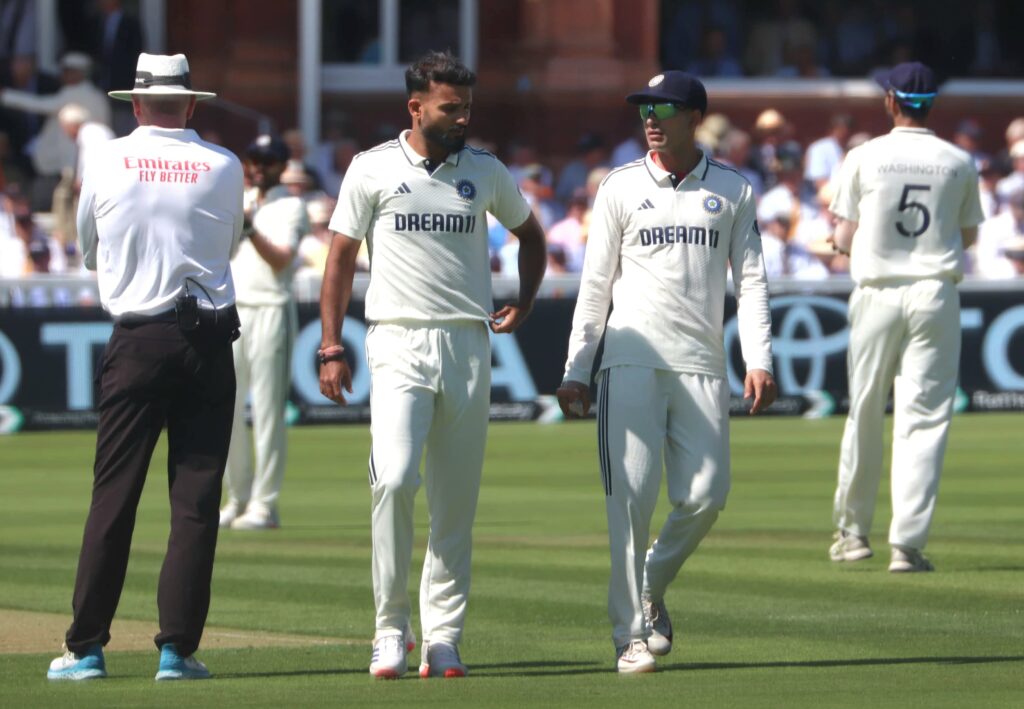
By Trisha Ghosal in Manchester
In Test cricket, pressure exposes character. And in Manchester, with the series on the line and Jasprit Bumrah struggling, Shubman Gill wasn’t just out-thought — he was outmanoeuvred. There was no spark, no urgency, no coherent plan. Just a young captain watching the game drift from slip while England seized control.
India now face a grim scenario. England lead by 186 runs with three wickets still in hand. But the real concern isn’t the scoreboard — it’s Gill’s worrying inaction at a moment that demanded leadership.
No Plans, No Pressure, No Response
When Zak Crawley and Ben Duckett commenced England’s innings on Day 2, India showed no clear tactical direction. The seamers searched for movement, but their lines lacked precision — especially against Duckett, who was repeatedly allowed to score freely on the leg side.
Should a captain cover for poor bowling? No. But when a batter is attacking in the air, logic dictates a fielding adjustment. Duckett had fallen in similar fashion at Lord’s — to a loose ball down leg. It’s a reminder that wickets don’t always require brilliance; sometimes, they just need smart, reactive thinking. England grasped that. India didn’t.
England Strategise. India Wait.
Take the case of Sai Sudharsan’s near-dismissal. He gloved one down leg. It wasn’t random — England had clearly studied this pattern. Had Jamie Smith held the catch, it would’ve been another deliberate plan brought to life.
That’s what you expect from a Test captain — proactive thinking, data-backed choices, and confidence in execution. Gill, by contrast, looked adrift. Set against England’s clarity, the difference was glaring.
Six Bowlers Picked. Four Used.
India entered the match with six bowling options. Gill used just four.
Shardul Thakur — already uncertain in his role — bowled only five overs out of 46 on Day 2. Yes, he was expensive. But so were most, barring Bumrah and Jadeja. His reward? One over at the start of Day 3, just to switch Bumrah’s end — and then nothing.
Before tea, he returned for two overs. After tea, three more. Then vanished.
Even when Bumrah and Siraj were visibly drained in the final hour, Gill didn’t turn to Thakur. He chose Siraj again, instead of offering Thakur rhythm and responsibility.
If Thakur isn’t trusted, why pick him over Kuldeep Yadav?
Also Read: “Why Isn’t Kuldeep Playing?” and Other Questions India Can’t Keep Dodging

Washington Held Back Until Too Late
Washington Sundar’s handling was equally baffling. On a surface where Liam Dawson found drift from Day 1, Sundar wasn’t introduced until the 69th over.
And when he finally bowled? He made an immediate impact — two wickets, control, and answers to long-standing questions.
Gill had no valid reason to delay his introduction. When Anshul Kamboj looked undercooked and England were cruising, Sundar should’ve been deployed. It is also true that Sundar only bowled about four overs at Ben Stokes when he commenced his innings. Gill could have trusted him to bowl a few more overs with the old ball, considering Stokes’ problems against spinners.
Again, if you don’t back your spinner, why include him?
Dawson = Root?
The field settings were at times baffling. When Liam Dawson came in to bat, common sense suggested building pressure on the newcomer.
Instead, Gill spread the field as though bowling to Joe Root.
No silly point. No short leg. No tight cordon. Just a welcome mat for Dawson to get comfortable, swing freely, and survive. It wasn’t tactical caution. It was poor judgement.
Stokes Hunts. Gill Waits.
Ben Stokes is always switched on. On Day 1, he noticed hesitation between Shardul and Jadeja and instantly chased a run-out. That’s awareness. That’s initiative. That’s captaincy.
Compare that to the moment when debutant Kamboj was being targeted. Did Gill walk over? Offer guidance? Nope. It was Dhruv Jurel who sprinted from behind the stumps. Siraj said a few words. Gill, standing close by, just watched.
Later, as the innings unravelled, it was KL Rahul who stepped in — gesturing, adjusting fields, talking. Gill? Still, passive. Disconnected. Practically invisible.
The Shoulders Dropped Before the Lead Crossed
By the end of Day 3, England hadn’t just taken a lead, they’d taken the fight out of India. You could see it. In energy. On the field. In the faces. And most tellingly, in the captain.
Yes, it’s only Gill’s fourth Test as skipper. But leadership in Test cricket is trial by fire. You must adapt quickly or the game moves past you.
Losing a session is forgivable. Failing to respond to it? That’s far more damaging.
The most damning image of Day 3 wasn’t a dropped catch or a boundary. It was captain Gill, shoulders slumped, gaze distant – adrift in a contest England were dominating.
India needed a captain.What they got was a passenger.
Follow RevSportz For More Such Stories From England



